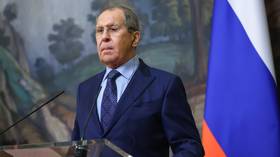NATO offers Russia meeting
NATO has told Russia that an invitation to meet has not been taken off the table amid increasingly strained relations, as Moscow voices concerns that the US-led military bloc is treading close to its self-declared boundaries.
Speaking on Wednesday as part of a discussion on ‘Peace policy in our time,’ NATO Secretary General Jens Stoltenberg said that the organization champions “what we call the dual track approach to Russia; deterrence, defense but also dialogue.”
“There’s no contradiction… between being firm in our strategy to our neighbor in the East, at the same time engaging in” communication, he added.
He also renewed calls for Moscow to de-escalate its purported buildup on the Ukrainian border, “and to be transparent about their intentions.” Russian officials, however, have stepped out in recent weeks to dismiss such claims.
Stoltenberg has previously expressed regret that a meeting of the NATO-Russia Council has not been held for 18 months, and stressed that the invite still stands.
However, Russian Foreign Minister Sergey Lavrov said last month that past dialogue between the two proved fruitless and that the bloc was more interested in lecturing Moscow about Kiev.
“Their whole interest was whipping up propaganda and putting pressure on Russia,” Lavrov said.
Stoltenberg’s remarks come amid reignited tensions between Moscow and the military bloc. Speaking on Tuesday, Russian President Vladimir Putin told his US counterpart Joe Biden that his country is “seriously interested” in getting “reliable and firm legal guarantees” which would rule out NATO’s expansion further into eastern Europe, as well as the deployment of “offensive strike weapons systems in countries adjacent to Russia.”
Lavrov sounded the alarm last week, stating that “significant units and armaments from NATO countries, including American and British, are being moved closer to our borders.” The top diplomat said that in neighboring Ukraine, “more and more forces and equipment are being accumulated on the line of contact in the Donbass, supported by an increasing number of Western instructors,” and warned that alleged anti-Russian actions could spill into a conflict.
Last month, Lavrov’s deputy Alexander Grushko condemned Stoltenberg’s plans to shuttle American warheads around Eastern European countries, arguing that they threatened peace accords signed between the two parties.
In October, Moscow said it would suspend all direct bilateral ties with NATO and close the door of the bloc’s offices in the Russian capital. The move came as a response to the expulsion of eight Russian diplomats from its Brussels headquarters, thought to be over claims of involvement in undisclosed ‘espionage.’














